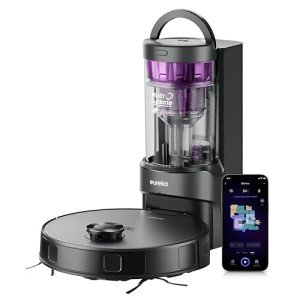How To Solve Issues Related To Self-Cleaning Robot Vacuums
Self-Cleaning Robot Vacuums: Revolutionizing Home Cleaning
In a period where technology continuously reshapes daily chores, one impressive innovation stands apart— self-cleaning robot vacuums. These ingenious gadgets are not simply a high-end; they represent a considerable action towards smart home living, offering benefit and effectiveness. As more house owners accept automation, the understanding of self-cleaning robot vacuums becomes important. This article explores the operations, benefits, and functions of self-cleaning robot vacuums, guiding customers towards notified decisions.
Understanding Self-Cleaning Robot Vacuums
Self-cleaning robot vacuums are autonomous gadgets developed primarily for floor cleaning. Unlike conventional vacuum that need manual operation, these robots perform their tasks with very little human intervention. Equipped with innovative technology, consisting of sensing units and artificial intelligence, self-cleaning robot vacuums navigate through homes, determining and taking on dirt and particles successfully.
How Do They Work?
These gadgets run through a series of steps, guaranteeing thorough cleaning with every run.
- Navigation: Through mapping and sensors, self-cleaning vacuums chart the home's layout.
- Cleaning: They use brushes and suction to choose up dirt from different floor surface areas, such as wood, tile, or carpet.
- Self-Cleaning: After finishing their cleaning cycle, they go back to a docking station where debris is cleared into a bag or container, frequently removing the requirement for users to touch dirt.
- Smart Features: Many models incorporate with home automation systems, making it possible for arranged cleaning, push-button control, and updates through smartphone apps.
Secret Features of Self-Cleaning Robot Vacuums
To understand the appeal of self-cleaning robot vacuums, it's vital to explore their standout features:
Feature
Description
Autonomous Navigation
Efficient in mapping rooms and preventing challenges for effective cleaning.
Self-Charging
Automatically returns to its charging dock when the battery is low.
HEPA Filtration
Equipped with high-efficiency filters that trap allergens and enhance air quality.
Smart Connectivity
Can be managed via smart device apps or smart home systems like Alexa or Google Home.
Multiple Cleaning Modes
Offers different settings for selective cleaning, including spot cleaning and edge cleaning.
Benefits of Self-Cleaning Robot Vacuums
The rise of self-cleaning robot vacuums brings numerous notable advantages that deal with modern lifestyles:
- Time-Saving: Automating cleaning tasks means users spend less time vacuuming floors, allowing them to concentrate on other activities.
- Consistent Cleaning: With arranged cleaning, homes stay regularly tidy, assisting to preserve a healthy living environment.
- Reduced Allergens: The HEPA filters used in many self-cleaning designs capture dust, animal dander, and other irritants, improving indoor air quality.
- Benefit: The self-emptying feature decreases the frequency of upkeep and user interaction with dirt and particles.
- Versatility: Many self-cleaning vacuums are equipped to deal with different surface areas, ensuring they can keep cleanliness throughout the home.
Popular Self-Cleaning Robot Vacuum Models
When checking out the world of self-cleaning robot vacuums, different designs accommodate various requirements and spending plans. Below is a list of popular choices:
- iRobot Roomba i7+: Notable for its sophisticated navigation and the ability to empty its dustbin instantly.
- Ecovacs Deebot Ozmo T8 AIVI: Offers effective suction integrated with mopping capabilities for extensive cleaning.
- Roborock S7: Features advanced mapping innovation and a self-emptying base, ensuring minimal intervention.
- Shark IQ Robot Self-Emptying: Known for its excellent value and effective dirt detection innovation.
Aspects to Consider Before Purchasing
Choosing the best self-cleaning robot vacuum involves understanding particular needs. Here are some factors to consider:
- Flooring Type: Ensure the design appropriates for the types of floors in your house (e.g., carpet, wood).
- Pet Ownership: Consider vacuums with strong suction and tangle-free technology for homes with pets.
- Smart Features: Assess the smart home combination alternatives offered based on your tech choices.
- Battery Life: Look for models with long battery life to support bigger spaces.
- Upkeep and Filters: Consider how typically filters need replacing and how easy it is to clear the dustbin.
Frequently Asked Questions About Self-Cleaning Robot Vacuums
1. How frequently should I run my robot vacuum?
A lot of makers recommend running the robot vacuum everyday or numerous times a week, depending on the amount of foot traffic and pet activity in your house.
2. Are robot vacuums reliable on carpets?
Yes, numerous self-cleaning robot vacuums are particularly developed for carpets, featuring powerful suction and brushes to lift dirt successfully.
3. Do I need to vacuum before utilizing a robot vacuum?
While self-cleaning robot vacuums can manage small amounts of debris, it's a good idea to clear larger products or obstacles to make sure optimum efficiency.
4. How do I preserve my robot vacuum?
Routinely examine and clean up the brushes, empty the dustbin, and replace filters as necessary to keep the vacuum working effectively.
5. Can self-cleaning robot vacuums mop?
Some designs feature mopping abilities, permitting them to vacuum and mop simultaneously, offering extensive cleaning.
Self-cleaning robot vacuums exemplify the future of household cleaning, combining innovation with benefit. Their ability to autonomously browse, tidy, and self-maintain makes them a notable addition to any home. As these devices continue to progress, homeowners will discover increasing value in their efficiency and effectiveness. Comprehending robotic hoovers and advantages will empower customers to pick the best model to fit their cleaning needs and way of life. As the marketplace grows, self-cleaning robot vacuums are set to end up being an important part of modern-day domestic life.
